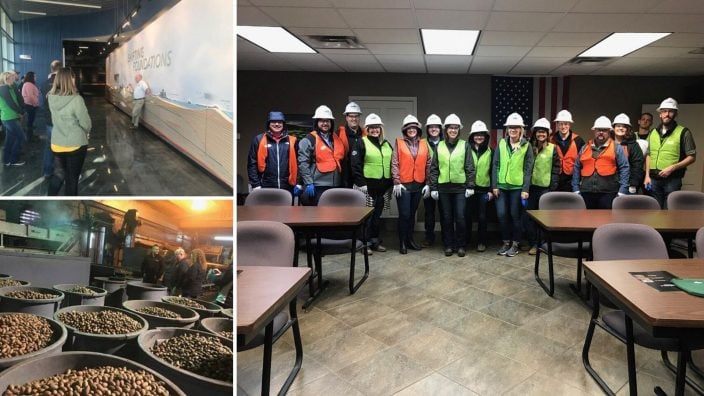Farmer’s Guide to Trucking Regulations available to Ohio Farm Bureau members
The guide includes a farm driver checklist, overview of state and federal regulations and exemptions, CDL qualifications and more.
Read More
AgriPOWER Class XI, Session 6 took us to the diverse state of Louisiana. We started our session with a soggy yet informative tour of the Cargill Westwego Grain Elevator located on the Mississippi River at milepoint 103. Supervisor of the Westwego facility, John Kimmel, started with a PowerPoint that really showcased how massive his facility is. To give you a couple of their unloading capacity statistics…Their barge receiving can unload 90,000 bushels an hour and rail receiving can unload 35,000 bushels an hour. No worries about if they will run out of storage though. The facility holds a massive 4 million bushels of grain!! To put that in perspective, a typical grain hauling trailer you would pass on the road holds approximately 950 bushels of grain. Imagine 4,210 trailers stacked together to accommodate 4 million bushels of grain! Fortunately for Ohio farmers, the Mississippi River and its tributaries enables our grain to reach world markets faster and more efficiently.
The rain slowed up a bit for our self-guided tour of the beautiful Oak Alley Plantation. Originally built as a sugar cane plantation 200 years ago, the property has been used for many things in its 200 years. It was at Oak Alley where we were able to experience some authentic Louisiana cuisine, some beautiful 200-year-old trees and a history lesson on how slaves were used to build and maintain the plantation.
The Louisiana Sugar Refinery was the next stop on our tour. Here safety took the utmost priority before we were able to enter the refinery. Once the class was all geared up with the required personal protective equipment, we were able to enter the refinery. It was at this point we learned that LSR is capable of refining 2 billion pounds of white sugar annually for distribution to commercial and retail customers throughout the United States.
Once we were all sweetened up from our LSR tour, we had some laughs while learning with Brandon Gravios who is the owner/operator of River Road Perique and Rolling G Cattle. He also is the manager of Edgard Farms where they grow sugar cane and have several crawfish ponds. Brandon was kind enough to climb on the tour bus with us and answer the over abundance of questions we had regarding crawfish, sugar cane and perique tobacco.
Friday morning we went to the Louisiana State Penitentiary. The prison is the largest maximum security prison in the United States. The prison is composed of 18,000 acres of property where they raise 1800 head of cattle, horses, a small pecan orchard, numerous vegetables, soybeans, corn, cotton and a camel! Once the prisoners have earned trustee status, they are able to earn money by working in the fields, tending the cattle and keeping equipment maintained. It was uneasy being within the walls of the prison but an experience of a lifetime.
H.J. Bergeron Pecan Shelling Plant was our next stop. Here we learned about the third-generation pecan farm where they shell, package and ship 32,000 pounds of pecans a day during peak season! Before this tour, I has no idea what all went into getting the pecans out of shell, sorting by size, cleaning, cracking, sorting…it is quite the process and a lot of it is done by hand. The family purchases its pecans from local growers with a handshake. No contracts needed for these folks.
We finished our trip with a tour of The Water Campus in Baton Rouge, a world-class research campus devoted to the study of coastal restoration and sustainability. The Mississippi River formed much of Louisiana. Water from the Mississippi is pumped into the industries that line its banks for manufacturing of products that in turn, are shipped out over the same river waters to markets around the world. Unfortunately, Louisiana is washing away. The wetlands are disappearing at the alarming rate of 24 square miles per year which is equal to a football field every 38 minutes. Within the water campus they have built a river model that is 10,000 square feet and based on the topography and bathymetry of the Mississippi River Delta covering southeast Louisiana. Pumps are used to control water and sediment injections. The hope is the model will be able to replicate the flow, water levels and sediment transport of the river, where one year of the Mississippi River is simulated in one hour. Using this river model they are experimenting with the best location for manmade levy gates to allow sediment to flow into certain parts of Louisiana with the hope of slowing down the rate that the wetlands are disappearing.
Once the work was done the class participants who were interested were able to experience Bourbon Street during Mardi Gras on our last night in Louisiana. What an experience that most of us will likely never forget. AgriPOWER has been such an amazing team building, networking opportunity that has taught me more than I thought possible and like every other session this trip to Louisiana did not disappoint!
Online Extra:
Louisiana didn’t disappoint–Session 6 blog by Rich Maxwell


The guide includes a farm driver checklist, overview of state and federal regulations and exemptions, CDL qualifications and more.
Read More


Katie Share of Columbus has been named ExploreAg and Youth Development Specialist for Ohio Farm Bureau.
Read More

Mary Klopfenstein of Delphos has been named Young Ag Professional and Ag Literacy Program Specialist for Ohio Farm Bureau.
Read More

The plan has been updated to give sole proprietors access to more rate stability and a smart solution that offers potential savings on health care.
Read More

The American Farm Bureau Federation, in partnership with Farm Credit, is seeking entrepreneurs to apply online by June 15 for the 2025 Farm Bureau Ag Innovation Challenge.
Read More

Adele Flynn of Wellington has been elected treasurer of the Ohio Farm Bureau Federation and now holds the third highest elected office in Ohio’s largest and most influential farm organization.
Read More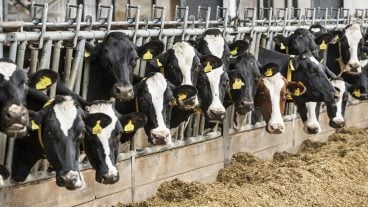
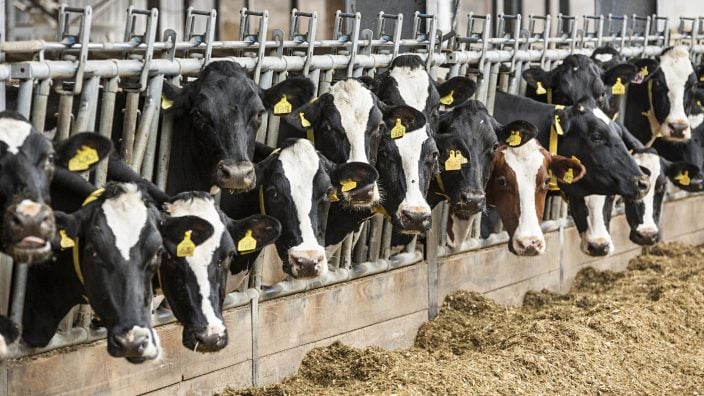
Producers are urged to work with their veterinarian to practice enhanced biosecurity measures and review and limit cattle movements within production systems.
Read More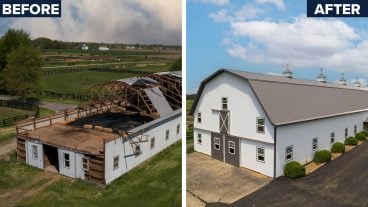
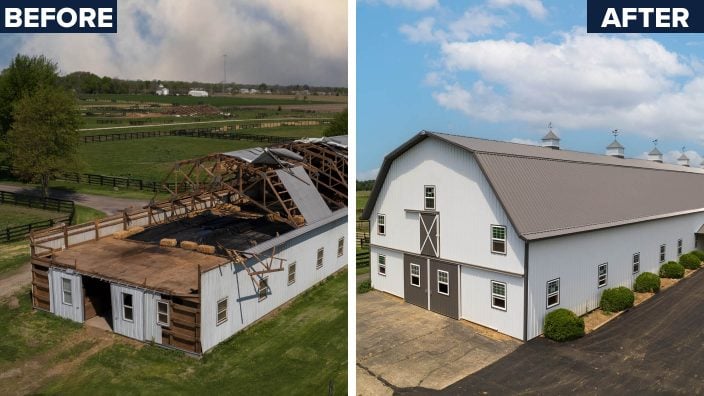
The changing seasons bring with them the need to thoroughly inspect pole barns for any damages that may have occurred during the winter months.
Read More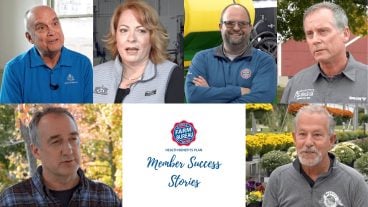
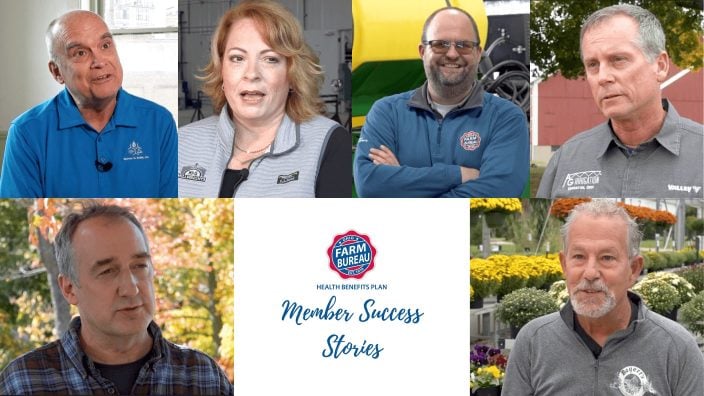
Hundreds of Ohio businesses and sole proprietors are raving about Ohio Farm Bureau’s Health Benefits plan with lower, predictable costs and easy enrollment and administration options.
Read More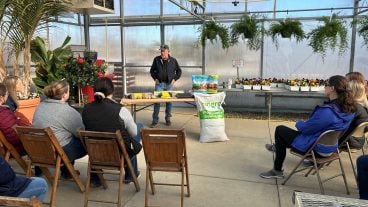
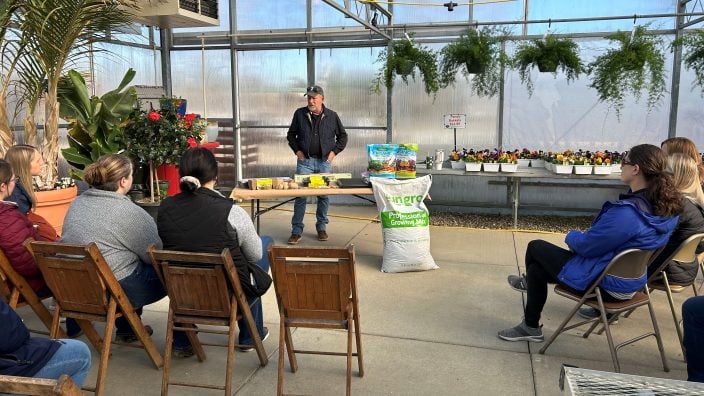
AgriPOWER Class XIV spent a few days in March in Medina and Wayne counties learning more about northern Ohio agriculture from leaders in Ohio Farm Bureau.
Read More